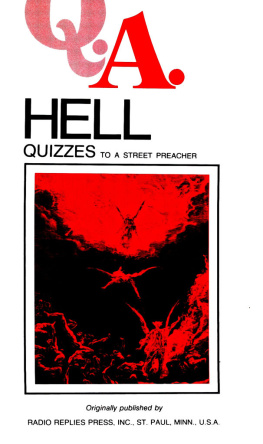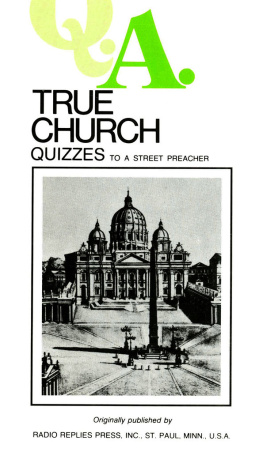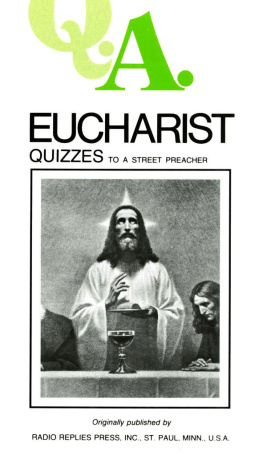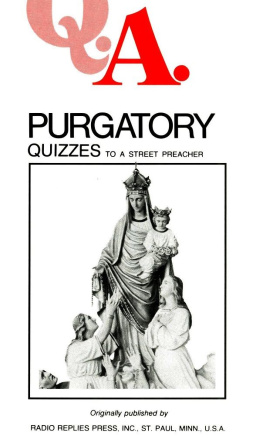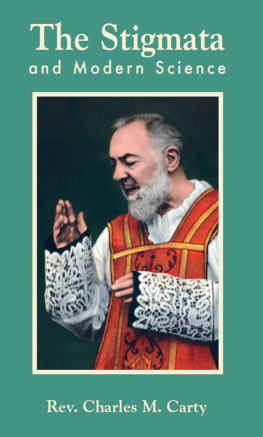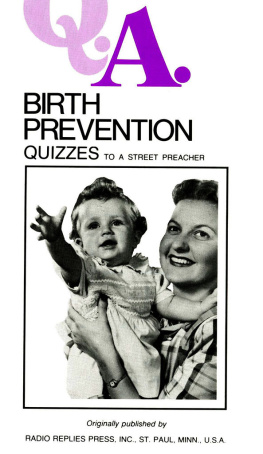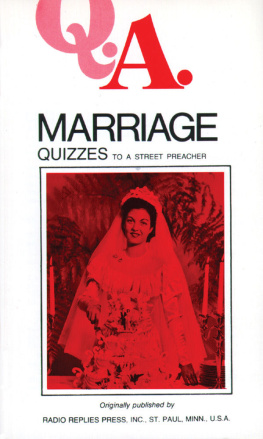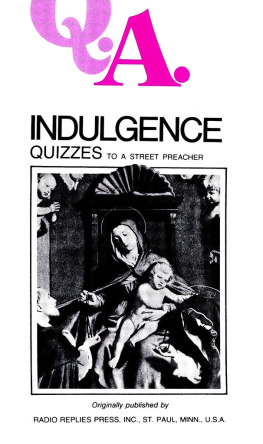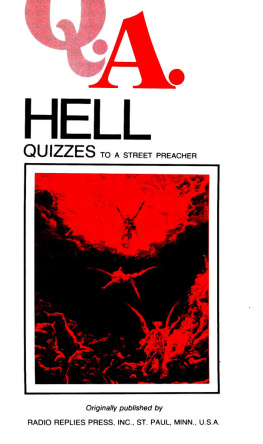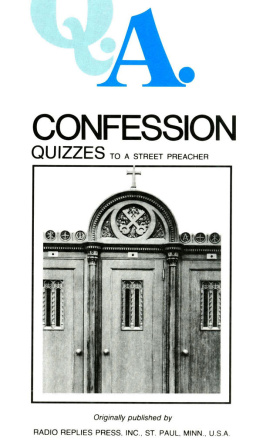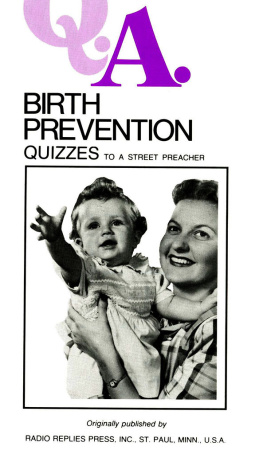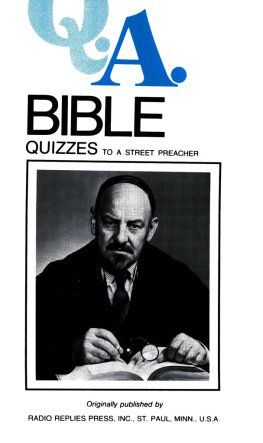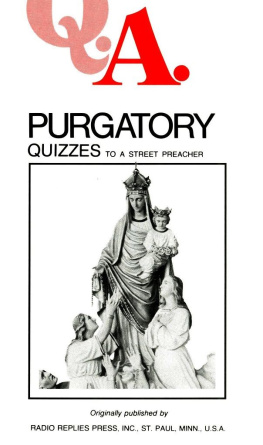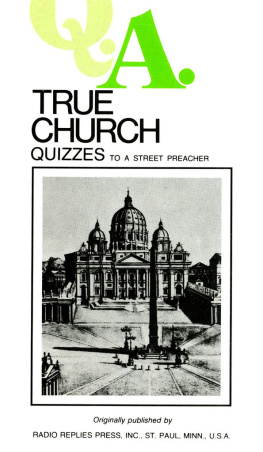Charles Mortimer Carty - Hell Quizzes to a Street Preacher
Here you can read online Charles Mortimer Carty - Hell Quizzes to a Street Preacher full text of the book (entire story) in english for free. Download pdf and epub, get meaning, cover and reviews about this ebook. year: 1992, publisher: TAN Books, genre: Religion. Description of the work, (preface) as well as reviews are available. Best literature library LitArk.com created for fans of good reading and offers a wide selection of genres:
Romance novel
Science fiction
Adventure
Detective
Science
History
Home and family
Prose
Art
Politics
Computer
Non-fiction
Religion
Business
Children
Humor
Choose a favorite category and find really read worthwhile books. Enjoy immersion in the world of imagination, feel the emotions of the characters or learn something new for yourself, make an fascinating discovery.
- Book:Hell Quizzes to a Street Preacher
- Author:
- Publisher:TAN Books
- Genre:
- Year:1992
- Rating:5 / 5
- Favourites:Add to favourites
- Your mark:
- 100
- 1
- 2
- 3
- 4
- 5
Hell Quizzes to a Street Preacher: summary, description and annotation
We offer to read an annotation, description, summary or preface (depends on what the author of the book "Hell Quizzes to a Street Preacher" wrote himself). If you haven't found the necessary information about the book — write in the comments, we will try to find it.
Charles Mortimer Carty: author's other books
Who wrote Hell Quizzes to a Street Preacher? Find out the surname, the name of the author of the book and a list of all author's works by series.
Hell Quizzes to a Street Preacher — read online for free the complete book (whole text) full work
Below is the text of the book, divided by pages. System saving the place of the last page read, allows you to conveniently read the book "Hell Quizzes to a Street Preacher" online for free, without having to search again every time where you left off. Put a bookmark, and you can go to the page where you finished reading at any time.
Font size:
Interval:
Bookmark:
Hell Quizzes
to a Street Preacher
Fr. Chas. M. Carty
&
Rev. Dr. L. Rumble, M.S.C.
Archiepiscopus Sancti Pauli.
Written by
Fr. Chas. M. Carty
&
Rev. Dr. L. Rumble, M.S.C.
Copyright 1976 by TAN Books
Originally published by
Fathers Rumble and Carty
Radio Replies Press, Inc.
St. Paul, Minn., U.S.A.
Complete and Unabridged
TAN Books
Charlotte, North Carolina
www.TANBooks.com
1976
CONTENTS
HELL QUIZZES TO A STREET PREACHER
All around us today we hear non-Catholics declaring that, "There is no Hell," "Hell is a myth," "Intellectual progress has abolished Hell." Prof. G. H. Betts, of the Northwestern University in his book "The Belief of 700 Ministers," shows in his tabulations of replies received from 500 ministers and 200 Protestant theological schools, in 20 denominations that 13 per cent were uncertain of Hell's existence, and 34 per cent disbelieved or denied the existence of Hell. As a conclusion to his findings he says, "No denomination except perhaps the Lutherans has any right to demand that fixed creeds shall be taught their young."
The following questions and statements to a radio and street preacher are samples of what the so-called Reformation has done for the modern mind:
1. I don't like Hell .
Who does like Hell? The fact that you don't like Hell doesn't prove that it is all humbug. Diderot, a rationalist, set down in his notes a little self-interrogation, "If you abuse your reason, my soul, you will not only be unhappy in this life, but still more unhappy in Hell."
"And who told you that there is a Hell?"
"Well, even if it be doubtful, you had better live as if there were one."
"What if I am sure there is no Hell?"
"I defy you to prove it."
Voltaire replied in the same strain to a friend who wrote to him, "I believe that I have at last found certainty that no Hell exists at all."
"Lucky man," wrote back Voltaire, "I am very far yet from that."
Still, many people choose not to believe in Hell, and in order to pat themselves on the back to give themselves confidence they assert no one really believes that ancient doctrine of priestcraft. There are 431,000,000 members of the Catholic Church who believe that ancient but still modern doctrine.
2. What do you mean by Hell?
Though the modernized man jokes about Hell, scoffs at it, doubts and denies it, Hell is the eternal lot of misery awaiting those who die in a state of grave sin and at enmity with God. Before the general resurrection, the soul alone experiences this misery; after the resurrection, the body will be reunited with that soul and will share in the misery, being tormented by created elements even as the person forsook God during life for the enjoyment of created things. The chief misery will be the sense of having lost happiness of the Vision of God; the other will be the torment of fire.
3. If you believe in Hell, you believe that it is necessary for others, but not for yourselves .
No Catholic believes that anyone necessarily goes to Hell. No man need go there at all. But if a man separates himself from God by sin and dies in a state of mortal or grave sin, he has fixed his state forever and will go to Hell; and this is truth which every Catholic admits as applicable to himself as well as to all other human beings.
4. Catholics cannot genuinely believe in Hell .
Catholics genuinely believe in the existence of Hell. I believe in it and I have not the most attenuated shadow of a doubt as to the existence of Hell. Nor has any other practical Catholic in this world. Pope, Cardinals, Bishops, priests and laymen all have this same faith, and sincerely.
5. No sane intellect could assimilate so horrible a doctrine .
Sane reason does not demand unbelief. Human intelligence cannot fully comprehend the mystery of eternal suffering, but that does not alter the fact that Hell exists, even as our not fully comprehending the medium of wireless transmission does not alter the fact that some such medium does exist. And if the thought of Hell is horrible, the thought that there is no Hell is still more horrible. Grave sin against the Creator is a more horrible thing than the Hell to which it leads. And that a creature could mock its Creator with impunity is more horrible than the punishment such conduct deserves.
6. Catholics must hate the doctrine of Hell .
They do not hate the doctrine of Hell, for they love the truth as revealed by God. Then, too, this doctrine is the vindication of God's justice, and it is not possible to hate the doctrine that God is justice itself. Catholics dislike the state of Hell of course; and hate the thought of anyone going there. But the doctrine they gladly accept.
7. No wonder Catholics live by fear, whilst Protestants have such childlike love and trust in God .
What do you mean by "fear"? Do you mean servile, cringing fear, or that filial reverent fear which Scripture declares to be the beginning of wisdom? And what do you mean by "childlike love and trust"? Do you mean the repeating of the formula, "Believe in Christ and be saved," and then going on with all kinds of things which God forbids? With hosts of Protestants, "childlike love and trust are matters of vague sentiment and self-persuasion, due to ignorance even of God's just demands and revealed doctrines. As, for example, when Protestant clergymen say to their people, "There is not really a Hell. No one can tell me that there is really a Hell." Why do they preach about Heaven and have they been really informed about Heaven? And, although God does tell us that there is a Hell, their poor people clutch at the thought fathered by their wish and regard it as childlike love and trust to deny what God has revealed. Finally, remember that real filial and reverent fear of God, such as is instilled into Catholics, in no way excludes genuine love of God and trust in Him. These are the true wisdom to which filial fear leads.
8. I admire Catholicism but I could never sincerely believe in Hell .
You could, if you had the faith which Catholics possess, namely, that the Catholic Church, which teaches this doctrine, has the commission, protection and authority of God, in matters of religion and moral conduct, to teach, guide, and rule the souls of men.
9. Could one become a Catholic without believing in Hell?
No. But you really make an impossible supposition. He who refuses to believe in any one authoritative teaching of Christianity could not possibly have perfect faith in any others. He might have immense confidence in his own opinion as to their truth. But that is not Christian faith. He believes the other doctrines, because he likes them, and refuses to believe this because he does not approve of it. That is not Christian faith. Faith accepts a thing as true on the authority of another.
If I have faith in Christ, I believe that He knows the truth and would not tell a lie. Whatever He says I acceptwhether I fully comprehend it or not because refusal to accept accuses Him of ignorance or want of veracity or want of authority. Deny any one thing Christ teaches and you deny faith in His knowledge and authority to teach. That motive having gone overboard, what do you accept?
You accept, not by faith in Christ or in His Church, but through confidence in your own powers of discernment. That might do, if you wish to be a disciple of yourself; but it will not do as a qualification to be a disciple of Christ and of the Catholic Church. It is all or nothing. If a man has Catholic faith, he accepts the teaching of the Catholic Church. If he will not accept her teaching, he has not received the gift of Catholic faith, and cannot become a Catholic until he does so.
10. What is the nature of Hell?
Hell is a state of eternal misery. Death in Hell would be a great mercy, only there is no death. There is but suffering, and an unending suffering in Hell. It is a departure from all that is good, holy, and beautiful. The misery of the privation of God is in proportion to the joy of the possession of God. The lost soul goes to remorse, suffering, and despair. There will be the remorse of eternal remembrance; not repentance, but consuming regret and degradation, regret that he should have to suffer thus; the degradation of his identification with sin. He is not so much in the act of sin as in the state of sin. Sin is, as it were, humanized in him. And consciousness of sin will come into its own. First sins bring fear and remorse to the timorous, shy, and pure conscience of a child. But men grow out of their conscience, and live it down. But what if the child conscience could knock at the heart of the grown man? And what if conscience were revived, and a man could get rid of neither his sins nor his conscience for all eternity? We can at least conceive of a mental Hell based on such a consideration.
Next pageFont size:
Interval:
Bookmark:
Similar books «Hell Quizzes to a Street Preacher»
Look at similar books to Hell Quizzes to a Street Preacher. We have selected literature similar in name and meaning in the hope of providing readers with more options to find new, interesting, not yet read works.
Discussion, reviews of the book Hell Quizzes to a Street Preacher and just readers' own opinions. Leave your comments, write what you think about the work, its meaning or the main characters. Specify what exactly you liked and what you didn't like, and why you think so.

